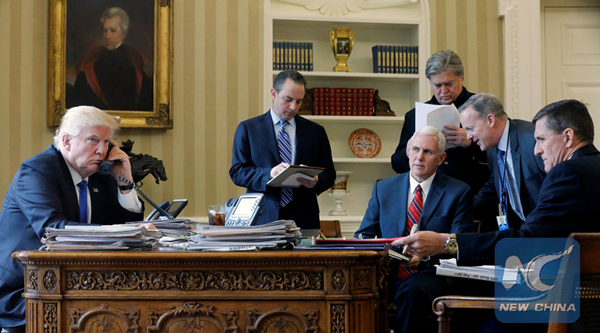The telltale resignation of Michael Flynn
china.org.cn / chinagate.cn by Sajjad Malik, February 17, 2017 Adjust font size:
|
|
|
U.S. President Donald Trump (L-R), joined by Chief of Staff Reince Priebus, Vice President Mike Pence, senior advisor Steve Bannon, Communications Director Sean Spicer and National Security Advisor Michael Flynn, speaks by phone with Russia's President Vladimir Putin in the Oval Office at the White House in Washington, U.S. January 28, 2017. [Xinhua] |
The resignation of National Security Advisor Michael Flynn smacks of an old narrative that runs through the entire gamut of relations between the U.S.-led West and Russia. Apparently an issue was blown out of proportion to force him to call it a day even before he had properly settled in his new job.
Mr. Flynn's story developed fast. He was accused of having had contact with the Russian ambassador before the inauguration when he was not authorized to do so. It would have been perfectly normal in case of a normal election and a normal occupant in the White House. Those being tipped off for powerful roles in an incoming government may well try to gauge the situation through interviews and contacts with officials of other countries.
Russia, being the most touchy and sensitive area for any defense aide of the U.S. president, will always require extra care and planning. What Mr. Flynn did was not out of place, although he should have been asked to deliver the full contents of his conversation with the ambassador to his bosses.
Mr. Flynn was accused of discussing the sanctions imposed on Russia by Obama during the conversation on Dec. 30. But the real problem started when he denied it and led the new administration to deny it as well. The situation worsened when it emerged that surveillance of Russian ambassador Sergei Kislyak revealed that he and Mr. Flynn had discussed the issue of U.S. sanctions.
Actually, former acting Attorney General Sally Yates had informed Trump's White House counsel Donald McGahn after inauguration day about Mr. Flynn violating protocol to discuss the sanctions. He might have violated an old law, the Logan Act of 1799. Under the law an unauthorized person cannot negotiate with a representative of a foreign government. The national security advisor was not authorized until his nomination was endorsed by the Senate and duly notified.
There could be widespread repercussions after Mr. Flynn's removal from the post. First, there should be the issue of moral authority to lead the country. Mr. Trump had been under the scanner for all the wrong reasons. He became President in the midst of a huge controversy when it was suspected that the outcome of the election had been influenced by the Russians.
The Democrats now have all the ammunition at their disposal to fire at the White House with merciless fury. Some of the former and sitting lawmakers are calling for further investigations to see if any harm was done to the national security of the country. Any formal probe will be damning for the administration, as it would shift the focus from key issues.
But the real loss might be in the realm of foreign relations. The positive reaction by Russian leadership upon Mr. Trump's success created a window of opportunity for improvement in ties between Washington and Moscow. The fallout of Mr. Flynn's resignation will force President Trump to harden his position, making it difficult to reach any kind of understanding on key international issues with President Putin.
It means that the possibility of a joint front against ISIS will remain a dream. Also, the chances for closer cooperation on the issue of Syria and Ukraine will become a distant possibility. The rift between the traditional rivals will further increase and bargaining for the sake of peace and stability will be harder to come by.
The resignation of Mr. Flynn demonstrates the extent of mistrust in the U.S. establishment against Russia. In fact, the Washington security establishment is overly obsessed with the Kremlin. That Russia was untrustworthy and planning to wreak havoc through hard and soft power is very old and is still part of official thinking.
As the situation has unfolded, instead of focusing on domestic and international issues, President Trump will be immediately preoccupied with finding a suitable replacement for Mr. Flynn. In the long run, he will constantly be looking back over his shoulder when making any big decision regarding Russia.
Sajjad Malik is a columnist with China.org.cn. For more information please visit:
http://www.china.org.cn/opinion/SajjadMalik.htm
Opinion articles reflect the views of their authors, not necessarily those of China.org.cn.
